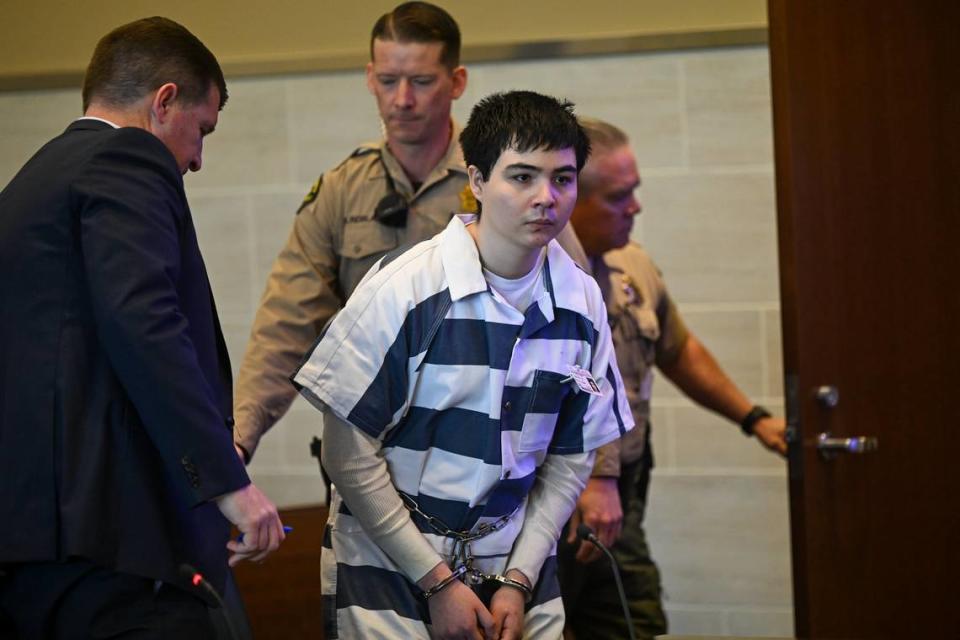Yolo DA will not seek death penalty in Davis stabbing case against Carlos Dominguez
As Carlos Reales Dominguez looked on from his seat in a Woodland courtroom, Davis police officers on Monday detailed the frantic moments neighbors tried in vain to revive one of the victims of last spring’s deadly stabbing spree.
“He was lifeless,” Davis police Cpl. Pheng Ly told prosecutors at Reales Dominiguez’s preliminary hearing which began Monday in Yolo Superior Court. Ly, a 24-year Davis police veteran, took over CPR but couldn’t revive UC Davis student Karim Abou Najm on April 29.
He said the witnesses had heard Najm call out, “Somebody help me. Oh my God, help me.”
Najm was the second of Reales Dominguez’s alleged victims. Two neighbors, including a doctor, whose homes border Sycamore Park, had heard Najm cry out, found his bleeding body on a park bicycle trail and began CPR, Ly testified.
The Yolo County District Attorney’s Office will not seek the death penalty against Reales Dominguez accused in a deadly Davis stabbing spree last spring, prosecutors told a judge Monday in Woodland.
“After thorough investigation, the people have made the election not to seek the death penalty at this time,” Deputy District Attorney Matthew De Moura told Yolo Superior Court Judge Samuel T. McAdam.
Reales Dominguez appeared strikingly different Monday than the disheveled, disoriented man who appeared in the days and months after his arrest; now appearing heavier and alert with a short-cropped haircut.
Reales Dominguez faced the first day of a scheduled four-day preliminary hearing, charged with murder and attempted murder in the three attacks in late April and early May. David Breaux, 50, and Najm, 20, were killed in separate Davis city parks days apart. Their slayings were followed by the brutal attack on 64-year-old Kimberlee Guillory as she slept in her tent May 1 in a homeless encampment. She survived the stabbing.
Reales Dominguez, whose mental health had deteriorated in the months before the knife attacks, was found unfit to stand trial and was briefly committed to a state hospital to regain competency. McAdam ruled the former UC Davis student competent in January, paving the way for Monday’s hearing.

Testimony continues Tuesday with another afternoon session scheduled Wednesday before McAdam.
In several hours of testimony Monday afternoon, Davis police investigators detailed their discoveries of the deadly attacks on Breaux at the city’s Central Park, Najm at Sycamore Park and the near-fatal attack on Guillory that left her with a lacerated kidney as she talked on the phone in her tent.
Davis officers testified they had found a sheath for a double-edged knife near Breaux’s body when he was slain April 27 in the first attack.
Officers found a double-edged knife days later in a reusable shopping bag that Reales Dominguez reportedly carried. An 18-speed bicycle and a water bottle streaked with what investigators believed to be blood were also found abandoned along a trail connecting Sycamore Park to west Davis, officers testified.
Reales Dominguez’s attorney, Yolo County deputy public defender Daniel Hutchinson, questioned whether a Davis detective who, with another investigator, had interviewed a mostly non-responsive Dominguez for more than seven hours was trained to spot signs of schizophrenic behavior.
Reales Dominguez did not drink water, ask for food or ask to use the restroom during his seven-hour interview with police, Hutchinson said during his questioning of Davis police Sgt. Mathew Muscardini.
Even when Reales Dominguez was told of the first-degree murder charges he faced, Dominguez “didn’t show any emotion at any time,” Hutchinson said. Finally, once the detectives left the interview room, Dominguez pulled on a sweatshirt and rose to leave, Hutchinson said.
“You questioned him for seven hours about two homicides and he said he was going to go out for a walk?” Hutchinson asked Muscardini.
The criminal case against Reales Dominguez was suspended after prosecutors conceded he was mentally incompetent to understand the charges he faced and assist in his own legal defense. This announcement came after impaneled jurors heard testimony from his ex-girlfriend, roommates and friends to determine whether he was mentally fit.
In December, state hospital doctors determined that Reales Dominguez’s mental competency was restored after receiving treatment at Atascadero State Hospital to restore his mental competency. Reales Dominguez was quickly brought back to Woodland where McAdam reinstated criminal proceedings against the 22-year-old on Jan. 5.
At the time, the judge said the doctor’s report indicated that Reales Dominguez has “sufficient knowledge and sufficient understanding of the legal procedure and charges, and his mental health disorder of schizophrenia with catatonia.”
“The report also indicates that the defendant has the capacity to rationally assist legal counsel,” McAdam said. “The report further indicates that the risk of self-harm is low, and the risk of harm to others in an institutional setting is low. And again, most importantly, the report indicates that the defendant is certified as competent to stand trial.”
Before he was transferred to the state, Reales Dominguez at times had refused antipsychotic medication while at the jail.
Reales Dominguez was a UC Davis biological science major who had excelled as a high school student-athlete in the East Bay but was dismissed from the university for academic reasons on April 25, two days before the deadly rampage started. In court testimony in June, his friends described him displaying bizarre behavior, becoming further withdrawn from society.

